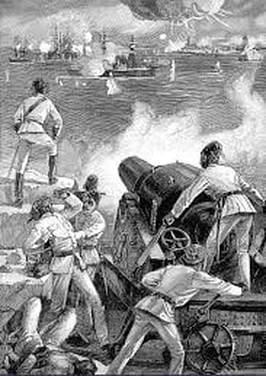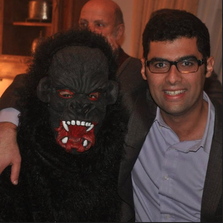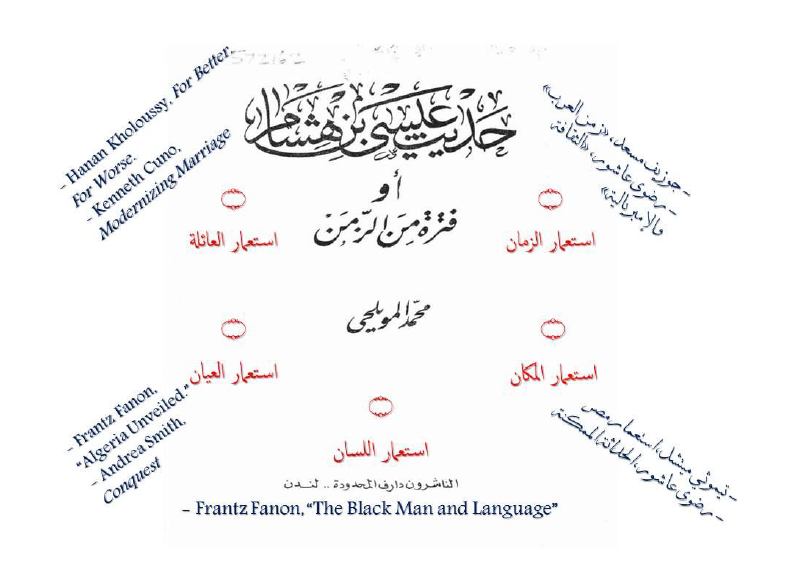
"فترة من الزمن": "استعمار مصر" وما أحدثه من تغيرات اجتماعية وثقافية
مقدم من أحمد ضياء
ايام الاحد في الصباح من ١١:٠٠ صباحاً إلى ٢:٠٠ ظهراً و في المساء من ٥:٣٠ إلى ٨:٣٠ مساءاً
The Turn of Time: “Colonising Egypt” and the Social and Cultural Changes it Imposed
By Ahmed Diaa
On Sunday mornings from 11:00 am to 2:00 pm and evenings from 5:30 pm to 8:30 pm
By Ahmed Diaa
On Sunday mornings from 11:00 am to 2:00 pm and evenings from 5:30 pm to 8:30 pm
ﻓﺘﺮة ﻣﻦ اﻟﺰﻣﻦ:" "اﺳﺘﻌﻤﺎر ﻣﺼﺮ" وﻣﺎ أﺣﺪﺛﻪ ﻣﻦ ﺗﻐﯿﺮات اﺟﺘﻤﺎﻋﯿﺔ وﺛﻘﺎﻓﯿﺔ
ﻓﻲ ﺳﻨﺔ 1882، دﺧﻠﺖ اﻟﻌﺴﺎﻛﺮ اﻹﻧﺠﻠﯿﺰﯾﺔ إﻟﻰ ﺑﺮ ﻣﺼﺮ ﻟﺘﺒﺪأ ﺑﺬﻟﻚ اﺛﻨﯿﻦ وﺳﺒﻌﯿﻦ ﻋﺎﻣﺎ ﻣﻦ اﻻﺣﺘﻼل اﻟﻌﺴﻜﺮي، وﻟﺘﺘﻮج ﺑﺬﻟﻚ
ﻣﺠﻤﻮﻋﺔ ﻣﻦ اﻟﺘﻐﯿﯿﺮات اﻻﺟﺘﻤﺎﻋﯿﺔ واﻟﺜﻘﺎﻓﯿﺔ واﻟﻤﺆﺳﺴﺎﺗﯿﺔ، اﻟﺘﻲ ﺑﺪأت ﻗﺒﻞ 1882 وﻟﻢ ﺗﻨﺘﻪ ﺑﺠﻼء اﻹﻧﺠﻠﯿﺰ ﻓﻲ .1954
وﻓﻲ ﺳﻨﺔ 1907 أﺻﺪر اﻟﻜﺎﺗﺐ واﻟﻤﻔﻜﺮ ﻣﺤﻤﺪ اﻟﻤﻮﯾﻠﺤﻲ ﺗﺤﻔﺘﻪ اﻷدﺑﯿﺔ، اﻟﺘﻲ ﻋﺪﻫﺎ ﺑﻌﺾ اﻟﻨﻘﺎد ﺑﻤﺜﺎﺑﺔ اﻟﺮواﯾﺔ اﻟﻌﺮﺑﯿﺔ اﻷوﻟﻰ ﻋﯿﺴﻰ ﺑﻦ ﻫﺸﺎم أو ﻓﺘﺮة ﻣﻦ اﻟﺰﻣﻦ وﻗﺪم ﻓﯿﻬﺎ رﺻﺪا دﻗﯿﻘﺎ ﻟﺘﻠﻚ اﻟﺘﻐﯿﺮات، وأﻋﺎﻧﻪ أﺳﻠﻮب اﻟﺴﺮد اﻟﺤﻮاري ﻋﻠﻰ ﻧﻘﺪ ﺣﺪﯾﺚ
أﺻﺤﺎب اﻟﺤﺪاﺛﺔ وأﻧﺼﺎر اﻷﺻﺎﻟﺔ ﺳﻮا ًء. وﻣﻦ ﺧﻼل ﻗﺮاءة ﻫﺬه اﻟﺮواﯾﺔ ﯾﺪﺧﻞ ﻣﺴﺎﻗﻨﺎ إﻟﻰ اﻟﺘﺎرﯾﺦ ﻣﻦ ﺑﺎب اﻷدب.
ﻓﻲ ﻫﺬا اﻟﻤﺴﺎق ﻧﻘﻮم ﺑﺎﺳﺘﻜﺸﺎف اﻟﺘﻐﯿﺮات اﻻﺟﺘﻤﺎﻋﯿﺔ واﻟﺜﻘﺎﻓﯿﺔ واﻟﻤﺆﺳﺴﺎﺗﯿﺔ اﻟﺘﻲ أﺣﺪﺛﻬﺎ اﻻﺳﺘﻌﻤﺎر ﻣﻦ ﺧﻼل ﻗﺮاءة ﻣﺠﻤﻮﻋﺔ ﻣﻦ اﻟﻨﺼﻮص ﺗﺘﺮاوح ﻣﺎ ﺑﯿﻦ اﻷدﺑﻲ واﻷﻛﺎدﯾﻤﻲ. وﺳﻨﻌﺘﻤﺪ ﺑﺸﻜﻞ أﺳﺎﺳﻲ ﻋﻠﻰ ﺣﺪﯾﺚ ﻋﯿﺴﻰ ﺑﻦ ﻫﺸﺎم وﺑﺸﻜﻞ أﻗﻞ ﻋﻠﻰ ﺗﯿﻤﻮﺛﻲ ﻣﯿﺘﺸﻞ اﺳﺘﻌﻤﺎر ﻣﺼﺮ )واﻟﺬي اﺗﺨﺬ ﻣﻦ ﻛﺘﺎب اﻟﻤﻮﯾﻠﺤﻲ ﻣﺼﺪرا ﻟﻺﻟﻬﺎم(، واﻟﻠﺬﯾﻦ ﺳﻨﻘﺮأﻫﻤﺎ ﺗﺒﺎﻋﺎ ﻗﺮاءًة ﻣﺘﺄﻧﯿًﺔ ﻣﺘﻨﻮﻋﺔ ﻣﺪار اﻟﻔﺘﺮة اﻟﺪراﺳﯿﺔ. ﻟﻦ ﺗﻘﺘﺼﺮ ﻣﻨﺎﻗﺸﺘﻨﺎ ﺑﺎﻟﻄﺒﻊ ﻋﻠﻰ ﻫﺬﯾﻦ اﻟﻨﺼﯿﻦ، وﻟﻜﻨﻨﺎ ﺳﻨﺴﺘﺨﺪﻣﻬﻤﺎ ﻻﺳﺘﻜﺸﺎف ﻣﻮاﺿﻊ اﻻﺳﺘﻌﻤﺎر ﻛﺘﺎب ﻋﻠﻰ
واﻟﺘﻲ ﺳﺘﺄﺧﺬﻧﺎ ﻓﻲ رﺣﻠﺔ ﺑﯿﻦ ﻣﺼﺎدر أوﻟﯿﺔ وﺛﺎﻧﻮﯾﺔ، ﺑﯿﻦ ﻗﺼﺎﺻﺎت ﻣﻦ اﻟﺠﺮاﺋﺪ اﻟﻘﺪﯾﻤﺔ ﺟﻨﺒﺎ إﻟﻰ ﺟﻨﺐ ﻣﻊ ﻧﺼﻮص أﻛﺎدﯾﻤﯿﺔ،
ﺑﻌﻀﻬﺎ ﯾﺨﺺ ﻣﺼﺮ، وﺑﻌﻀﻬﺎ ﯾﺤﻠﻞ اﻻﺳﺘﻌﻤﺎر ﻛﻈﺎﻫﺮة ﻋﺎﻣﺔ.
وﻟﻬﺬا، ﻓﺒﺪﻻ ﻣﻦ أن ﻧﻘﺪم ﺟﺪوﻻ ﻣﻔﺼﻼ ﯾﺤ ّﺼﺺ اﻟﻘﺮاءات واﻟﻤﻨﺎﻗﺸﺎت، ارﺗﺄﯾﻨﺎ أن ﻧﺮﺳﻢ اﻟﻤﺴﺎق ﺑﺤﯿﺚ ﯾﻈﻬﺮ ﻧﺺ ﻣﺤﻤﺪ اﻟﻤﻮﯾﻠﺤﻲ ﻓﻲ ﺻﻠﺒﻪ وﺣﯿﺚ ﺗﻨﺒﺖ ﻣﻨﻪ ﻣﻮاﺿﯿﻊ اﻟﻨﻘﺎش ﺛﻢ ﺗﺘﻔﺮع ﻣﻦ ﻛﻞ ﻣﻮﺿﻮع اﻟﻨﺼﻮص اﻷﺧﺮى اﻟﺘﻲ ﻗﺪ ﻧﻨﺎﻗﺸﻬﺎ. وﻧﺘﻮﻗﻊ
أن ﯾﻘﻮم اﻟﻨﻘﺎش ﻋﻠﻰ ﺧﻤﺴﺔ ﻣﺤﺎور: زﻣﻨﯿﺔ اﻻﺳﺘﻌﻤﺎر )اﻟﺘﻲ ﺗﻘﺪم اﻻﺳﺘﻌﻤﺎر ﻋﻠﻰ أﻧﻪ "اﻟﺤﺪاﺛﺔ" وﻣﺎ ﻋﺪاه ﺗﺨﻠﻔﺎ ﻋﻦ اﻟﺴﺒﻖ(،
واﺳﺘﻌﻤﺎر اﻟﻔﻀﺎﺋﯿﻦ اﻟﻤﺎدي واﻻﺟﺘﻤﺎﻋﻲ، واﺳﺘﻌﻤﺎر اﻟﻠﻐﺔ، واﻟﻤﺠﺎل اﻟﺒﺼﺮي اﻻﺳﺘﻌﻤﺎري )وﻋﻼﻗﺘﻪ ﺑﺎﻟﻌﻨﻒ اﻟﺠﻨﺴﻲ ﻟﻼﺳﺘﻌﻤﺎر ﻓﻲ ﻣﺼﺮ واﻟﺠﺰاﺋﺮ واﻷﻣﺮﯾﻜﺘﯿﻦ ﺳﻮاء(، واﺳﺘﻌﻤﺎر اﻟﻌﺎﺋﻠﺔ ﻋﻦ ﻃﺮﯾﻖ ﻓﺮض ﻧﺴﻘﻲ اﻟﺰواج واﻷﺳﺮة اﻟﻨﻮوﯾﺔ
اﻷوروﺑﯿﯿﻦ وﺗﺪﻣﯿﺮ ﻣﺎ ﺳﺒﻘﻬﻤﺎ ﻣﻦ ﻋﺎدات وﺗﺸﻜﯿﻼت اﺟﺘﻤﺎﻋﯿﺔ.
ﻟﻤﺎذا ﻫﺬا اﻟﻤﺴﺎق؟
ﻟﻨﺴﺘﻜﺸﻒ ﻫﺬه اﻟﻤﺮﺣﻠﺔ اﻟﻤﻬﻤﺔ ﻣﻦ ﺗﺎرﯾﺨﻨﺎ-
ﻟﻨﻨﺎﻗﺶ اﻷﺛﺮ اﻟﺬي أﺣﺪﺛﻪ اﻻﺳﺘﻌﻤﺎر ﻓﻲ ﺛﻘﺎﻓﺘﻨﺎ وﻣﺠﺘﻤﻌﻨﺎ-
ونمحص ثقافتنا المعاصرة لنري اثر الكولونيالية المستمر فيها -
لنقرأ عملاََ أدبياََ فذاََ قراءة متأنية و ندرس التاريخ من خلاله-
ﻓﻲ ﺳﻨﺔ 1882، دﺧﻠﺖ اﻟﻌﺴﺎﻛﺮ اﻹﻧﺠﻠﯿﺰﯾﺔ إﻟﻰ ﺑﺮ ﻣﺼﺮ ﻟﺘﺒﺪأ ﺑﺬﻟﻚ اﺛﻨﯿﻦ وﺳﺒﻌﯿﻦ ﻋﺎﻣﺎ ﻣﻦ اﻻﺣﺘﻼل اﻟﻌﺴﻜﺮي، وﻟﺘﺘﻮج ﺑﺬﻟﻚ
ﻣﺠﻤﻮﻋﺔ ﻣﻦ اﻟﺘﻐﯿﯿﺮات اﻻﺟﺘﻤﺎﻋﯿﺔ واﻟﺜﻘﺎﻓﯿﺔ واﻟﻤﺆﺳﺴﺎﺗﯿﺔ، اﻟﺘﻲ ﺑﺪأت ﻗﺒﻞ 1882 وﻟﻢ ﺗﻨﺘﻪ ﺑﺠﻼء اﻹﻧﺠﻠﯿﺰ ﻓﻲ .1954
وﻓﻲ ﺳﻨﺔ 1907 أﺻﺪر اﻟﻜﺎﺗﺐ واﻟﻤﻔﻜﺮ ﻣﺤﻤﺪ اﻟﻤﻮﯾﻠﺤﻲ ﺗﺤﻔﺘﻪ اﻷدﺑﯿﺔ، اﻟﺘﻲ ﻋﺪﻫﺎ ﺑﻌﺾ اﻟﻨﻘﺎد ﺑﻤﺜﺎﺑﺔ اﻟﺮواﯾﺔ اﻟﻌﺮﺑﯿﺔ اﻷوﻟﻰ ﻋﯿﺴﻰ ﺑﻦ ﻫﺸﺎم أو ﻓﺘﺮة ﻣﻦ اﻟﺰﻣﻦ وﻗﺪم ﻓﯿﻬﺎ رﺻﺪا دﻗﯿﻘﺎ ﻟﺘﻠﻚ اﻟﺘﻐﯿﺮات، وأﻋﺎﻧﻪ أﺳﻠﻮب اﻟﺴﺮد اﻟﺤﻮاري ﻋﻠﻰ ﻧﻘﺪ ﺣﺪﯾﺚ
أﺻﺤﺎب اﻟﺤﺪاﺛﺔ وأﻧﺼﺎر اﻷﺻﺎﻟﺔ ﺳﻮا ًء. وﻣﻦ ﺧﻼل ﻗﺮاءة ﻫﺬه اﻟﺮواﯾﺔ ﯾﺪﺧﻞ ﻣﺴﺎﻗﻨﺎ إﻟﻰ اﻟﺘﺎرﯾﺦ ﻣﻦ ﺑﺎب اﻷدب.
ﻓﻲ ﻫﺬا اﻟﻤﺴﺎق ﻧﻘﻮم ﺑﺎﺳﺘﻜﺸﺎف اﻟﺘﻐﯿﺮات اﻻﺟﺘﻤﺎﻋﯿﺔ واﻟﺜﻘﺎﻓﯿﺔ واﻟﻤﺆﺳﺴﺎﺗﯿﺔ اﻟﺘﻲ أﺣﺪﺛﻬﺎ اﻻﺳﺘﻌﻤﺎر ﻣﻦ ﺧﻼل ﻗﺮاءة ﻣﺠﻤﻮﻋﺔ ﻣﻦ اﻟﻨﺼﻮص ﺗﺘﺮاوح ﻣﺎ ﺑﯿﻦ اﻷدﺑﻲ واﻷﻛﺎدﯾﻤﻲ. وﺳﻨﻌﺘﻤﺪ ﺑﺸﻜﻞ أﺳﺎﺳﻲ ﻋﻠﻰ ﺣﺪﯾﺚ ﻋﯿﺴﻰ ﺑﻦ ﻫﺸﺎم وﺑﺸﻜﻞ أﻗﻞ ﻋﻠﻰ ﺗﯿﻤﻮﺛﻲ ﻣﯿﺘﺸﻞ اﺳﺘﻌﻤﺎر ﻣﺼﺮ )واﻟﺬي اﺗﺨﺬ ﻣﻦ ﻛﺘﺎب اﻟﻤﻮﯾﻠﺤﻲ ﻣﺼﺪرا ﻟﻺﻟﻬﺎم(، واﻟﻠﺬﯾﻦ ﺳﻨﻘﺮأﻫﻤﺎ ﺗﺒﺎﻋﺎ ﻗﺮاءًة ﻣﺘﺄﻧﯿًﺔ ﻣﺘﻨﻮﻋﺔ ﻣﺪار اﻟﻔﺘﺮة اﻟﺪراﺳﯿﺔ. ﻟﻦ ﺗﻘﺘﺼﺮ ﻣﻨﺎﻗﺸﺘﻨﺎ ﺑﺎﻟﻄﺒﻊ ﻋﻠﻰ ﻫﺬﯾﻦ اﻟﻨﺼﯿﻦ، وﻟﻜﻨﻨﺎ ﺳﻨﺴﺘﺨﺪﻣﻬﻤﺎ ﻻﺳﺘﻜﺸﺎف ﻣﻮاﺿﻊ اﻻﺳﺘﻌﻤﺎر ﻛﺘﺎب ﻋﻠﻰ
واﻟﺘﻲ ﺳﺘﺄﺧﺬﻧﺎ ﻓﻲ رﺣﻠﺔ ﺑﯿﻦ ﻣﺼﺎدر أوﻟﯿﺔ وﺛﺎﻧﻮﯾﺔ، ﺑﯿﻦ ﻗﺼﺎﺻﺎت ﻣﻦ اﻟﺠﺮاﺋﺪ اﻟﻘﺪﯾﻤﺔ ﺟﻨﺒﺎ إﻟﻰ ﺟﻨﺐ ﻣﻊ ﻧﺼﻮص أﻛﺎدﯾﻤﯿﺔ،
ﺑﻌﻀﻬﺎ ﯾﺨﺺ ﻣﺼﺮ، وﺑﻌﻀﻬﺎ ﯾﺤﻠﻞ اﻻﺳﺘﻌﻤﺎر ﻛﻈﺎﻫﺮة ﻋﺎﻣﺔ.
وﻟﻬﺬا، ﻓﺒﺪﻻ ﻣﻦ أن ﻧﻘﺪم ﺟﺪوﻻ ﻣﻔﺼﻼ ﯾﺤ ّﺼﺺ اﻟﻘﺮاءات واﻟﻤﻨﺎﻗﺸﺎت، ارﺗﺄﯾﻨﺎ أن ﻧﺮﺳﻢ اﻟﻤﺴﺎق ﺑﺤﯿﺚ ﯾﻈﻬﺮ ﻧﺺ ﻣﺤﻤﺪ اﻟﻤﻮﯾﻠﺤﻲ ﻓﻲ ﺻﻠﺒﻪ وﺣﯿﺚ ﺗﻨﺒﺖ ﻣﻨﻪ ﻣﻮاﺿﯿﻊ اﻟﻨﻘﺎش ﺛﻢ ﺗﺘﻔﺮع ﻣﻦ ﻛﻞ ﻣﻮﺿﻮع اﻟﻨﺼﻮص اﻷﺧﺮى اﻟﺘﻲ ﻗﺪ ﻧﻨﺎﻗﺸﻬﺎ. وﻧﺘﻮﻗﻊ
أن ﯾﻘﻮم اﻟﻨﻘﺎش ﻋﻠﻰ ﺧﻤﺴﺔ ﻣﺤﺎور: زﻣﻨﯿﺔ اﻻﺳﺘﻌﻤﺎر )اﻟﺘﻲ ﺗﻘﺪم اﻻﺳﺘﻌﻤﺎر ﻋﻠﻰ أﻧﻪ "اﻟﺤﺪاﺛﺔ" وﻣﺎ ﻋﺪاه ﺗﺨﻠﻔﺎ ﻋﻦ اﻟﺴﺒﻖ(،
واﺳﺘﻌﻤﺎر اﻟﻔﻀﺎﺋﯿﻦ اﻟﻤﺎدي واﻻﺟﺘﻤﺎﻋﻲ، واﺳﺘﻌﻤﺎر اﻟﻠﻐﺔ، واﻟﻤﺠﺎل اﻟﺒﺼﺮي اﻻﺳﺘﻌﻤﺎري )وﻋﻼﻗﺘﻪ ﺑﺎﻟﻌﻨﻒ اﻟﺠﻨﺴﻲ ﻟﻼﺳﺘﻌﻤﺎر ﻓﻲ ﻣﺼﺮ واﻟﺠﺰاﺋﺮ واﻷﻣﺮﯾﻜﺘﯿﻦ ﺳﻮاء(، واﺳﺘﻌﻤﺎر اﻟﻌﺎﺋﻠﺔ ﻋﻦ ﻃﺮﯾﻖ ﻓﺮض ﻧﺴﻘﻲ اﻟﺰواج واﻷﺳﺮة اﻟﻨﻮوﯾﺔ
اﻷوروﺑﯿﯿﻦ وﺗﺪﻣﯿﺮ ﻣﺎ ﺳﺒﻘﻬﻤﺎ ﻣﻦ ﻋﺎدات وﺗﺸﻜﯿﻼت اﺟﺘﻤﺎﻋﯿﺔ.
ﻟﻤﺎذا ﻫﺬا اﻟﻤﺴﺎق؟
ﻟﻨﺴﺘﻜﺸﻒ ﻫﺬه اﻟﻤﺮﺣﻠﺔ اﻟﻤﻬﻤﺔ ﻣﻦ ﺗﺎرﯾﺨﻨﺎ-
ﻟﻨﻨﺎﻗﺶ اﻷﺛﺮ اﻟﺬي أﺣﺪﺛﻪ اﻻﺳﺘﻌﻤﺎر ﻓﻲ ﺛﻘﺎﻓﺘﻨﺎ وﻣﺠﺘﻤﻌﻨﺎ-
ونمحص ثقافتنا المعاصرة لنري اثر الكولونيالية المستمر فيها -
لنقرأ عملاََ أدبياََ فذاََ قراءة متأنية و ندرس التاريخ من خلاله-
: Syllabus / المنهج
Knowledge of Arabic is pre-required
In 1882, Egypt fell to British military occupation, only to regain its independence in 1954. This 72 year occupation coronated a colonization process which predated the British invasion and was not put to an end by the withdrawal of British troops.
In this course we explore the social and cultural colonial changes that accompanied, predated, and outlasted the British occupation. This exploration will proceed through works of literature, newspaper clippings, and academic texts. Our discussion will start with and focus on Muhammad al-Muwaylihi’s brilliant narrative text Hadith ‘Isa ibn Hisham, written at the onset of the British occupation, tracing the changes that accompanied it, and sometimes credited for being the first Arabic novel. This course will use Hadith ‘Isa ibn Hisham as an opportunity to revisit cultural and social histories through a close reading of an exceptional work of literature.
Throughout the course we will be reading al-Muwaylihi’s text alongside a number of academic texts tracing the colonial changes Egypt went through; most notably Timothy Mitchell’s Colonising Egypt which was in many ways inspired by Hadith ‘Isa ibn Hisham. As al-Muwaylihi’s text will provide the backbone of our conversation, the course is designed so as to let the discussion take us to other texts and other themes that are related to the colonial transformations Egypt witnessed. The course is tentatively designed to proceed along 5 axes: colonial temporality, the colonization of space, the colonization of language, the colonial gaze, and the colonization of marriage and the family.
As we will be visiting many Arabic-language works in the original, knowledge of Arabic is pre-required for attending this course. In addition, some of the academic texts we are reading are only available in English and we expect the class discussion to proceed in both Arabic and English.
In 1882, Egypt fell to British military occupation, only to regain its independence in 1954. This 72 year occupation coronated a colonization process which predated the British invasion and was not put to an end by the withdrawal of British troops.
In this course we explore the social and cultural colonial changes that accompanied, predated, and outlasted the British occupation. This exploration will proceed through works of literature, newspaper clippings, and academic texts. Our discussion will start with and focus on Muhammad al-Muwaylihi’s brilliant narrative text Hadith ‘Isa ibn Hisham, written at the onset of the British occupation, tracing the changes that accompanied it, and sometimes credited for being the first Arabic novel. This course will use Hadith ‘Isa ibn Hisham as an opportunity to revisit cultural and social histories through a close reading of an exceptional work of literature.
Throughout the course we will be reading al-Muwaylihi’s text alongside a number of academic texts tracing the colonial changes Egypt went through; most notably Timothy Mitchell’s Colonising Egypt which was in many ways inspired by Hadith ‘Isa ibn Hisham. As al-Muwaylihi’s text will provide the backbone of our conversation, the course is designed so as to let the discussion take us to other texts and other themes that are related to the colonial transformations Egypt witnessed. The course is tentatively designed to proceed along 5 axes: colonial temporality, the colonization of space, the colonization of language, the colonial gaze, and the colonization of marriage and the family.
As we will be visiting many Arabic-language works in the original, knowledge of Arabic is pre-required for attending this course. In addition, some of the academic texts we are reading are only available in English and we expect the class discussion to proceed in both Arabic and English.

Ahmed Diaa is a PhD candidate in Middle Eastern Studies at Columbia University. He holds a Master’s degree in Middle Eastern Studies from Columbia University, and a Master’s degree in Political Theory from the American University of Beirut. He is interested in questions of state and subjectivity in the context of colonial modernity, in an attempt to understand our current political and social condition. Ahmed is also interested in literature and arts, and especially in theatre. He is also keen on stressing that he is the person on the right hand side of the picture, though he is sure the person on the left has a unique perspective on humanities.


